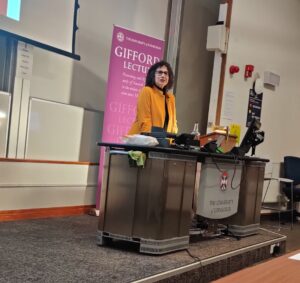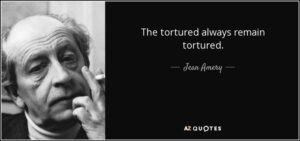Lecture 1: Who Needs Heroes?
Who Needs Heroes?
Professor Dorothy Miell welcomed us into 40 George Square for the first of Professor Susan Neiman’s lectures. Already overcoming a laptop malfunction since arriving this morning Professor Neiman, not defeated by Edinburgh’s grey weather and technology’s grey sign leapt into delivering her opening lecture.
Our lecture began with a quote from Thomas Carlyle, a Scottish philosopher, essayist and historian,
That hero-worship exists, has existed, and will forever exist
universally among mankind…(is) the cornerstone of living rock
whereon all polities for the remotest time may stand secure.
 Professor Neiman shared that when she started pondering the substance of these lecturers a few years ago she thought this quotation would prove obsolete. Our understanding of our history has thankfully extended beyond the hagiographies of powerful men. Today, objects such as cotton can be used as a focus point to examine our history. By tracing the manufacturing journey for instance, cross-cultural relationships and the impact of the economy can be examined through a different lens. ‘Surely,’ she thought, ‘ Carlyle’s claim that hero-worship will endure as long as we do has simply been disproven by time?’ Yet today’s admiration for Volodomyr Zelenskyy and his ability to mobilize his country to resistance and captivate an audience (even extending to the marketing world- End War, Eat Pizza) has questioned Neiman’s belief that the role of the individual in history has been disregarded, although she always believed this was mistaken.
Professor Neiman shared that when she started pondering the substance of these lecturers a few years ago she thought this quotation would prove obsolete. Our understanding of our history has thankfully extended beyond the hagiographies of powerful men. Today, objects such as cotton can be used as a focus point to examine our history. By tracing the manufacturing journey for instance, cross-cultural relationships and the impact of the economy can be examined through a different lens. ‘Surely,’ she thought, ‘ Carlyle’s claim that hero-worship will endure as long as we do has simply been disproven by time?’ Yet today’s admiration for Volodomyr Zelenskyy and his ability to mobilize his country to resistance and captivate an audience (even extending to the marketing world- End War, Eat Pizza) has questioned Neiman’s belief that the role of the individual in history has been disregarded, although she always believed this was mistaken.
“What would have happened to American Reconstruction had Lincoln not been assassinated? To Chile without the death of Allende? To Russia without the putsch that ousted Gorbachev and installed Yeltsin, whose drunken failures paved the way for Putin? To the Middle East peace process without the assassination of Rabin?”
The world wars also shook the historic image of a brave, combative hero. The men huddled in trenches in World War 1 did not bear this image, and World War 2 gave with different questions of whether the cause for the fight was justified, ‘It was Mussolini who wrote that the culture of the hero was fascism’s answer to bourgeois egotism.’ The well known slogan ‘one person’s terrorist is another person’s freedom fighter’ was another problematic claim on which her work focused, since it suggests that the question is entirely subjective and cannot be decided by reasons. She also noted suicide bombers are usually being well-educated and prosperous men who question our consumerists and capitalist culture.
Sometimes, the bumping off of heroes from their pedestals shows the development of our historical understanding, Neiman presented, especially with the case of Christopher Columbus who was revealed as being removed from his position as governor from the awful way he treated enslaved people in the Dominican Republic. Similarly, people thought Hitler and Stalin were heroes. Some have advocated for replacing the concept of hero with ‘role model’ but Neiman believes that ‘morally resonant language that is one of the strongest conceptual weapons we possess’ and instead these problematic figures are where we need to begin the conversation, not end it.
Must a hero make sacrifices, and how many? How much failure can a hero bear? Heroes need not be flawless, but how many flaws can we accept? What moves people to heroism, and how much does motivation matter?
The 20th Century however turned away from these questions and introduced something new. ‘Throughout millenia, people struggled for recognition of what they’d done in the world. Today they struggle for recognition of what the world has done to them.’ This shift of focus began as an act of justice, to avoid the double death for victims, ‘one in flesh and one in memory’ and gave space for victims to assert their recognition. Yet Neiman points out that these best intentions has also led some to promote victimization, to the extent of the invention of victimhood in cases such as Benjamin  Wilkomirski who falsely claimed that his childhood was spent in a concentration camp. Neiman, contesting the new popular mindset, asserted that in the case of Frederick Douglas, ‘prevailing over victimhood, could be a source of pride; victimhood itself was not.’
Wilkomirski who falsely claimed that his childhood was spent in a concentration camp. Neiman, contesting the new popular mindset, asserted that in the case of Frederick Douglas, ‘prevailing over victimhood, could be a source of pride; victimhood itself was not.’
‘Victimhood Olympics’ she stated are evident in that the field of memory studies concentrate almost exclusively on bad memories. The volution of memory in Israel was an interesting case study. Neiman shared that the Jewish focus on the Holocaust began relatively late, not until the 1970’s. The original goal for the 1948 State of Israel was to allow for Jewish people to have equal opportunities for self-determination and enter into normality. Netanyahu however, pushed the Holocaust to the forefront of Israeli identity. Germany’s largest publisher presented Netanyahu with Himmler’s architects original Auschwitz ground plans as a gift- one that would have been very offensive only 50 years prior.
‘Recognition is no longer provided by doing more than another, but by enduring more than another,’ and a competition of pain, Neiman declares, prevails. Instead, victimhood should be a source for claims to restitution and reparations,

but nothing else, and virtue be protected for what we do with what happens to us. Jean Amery for instance did not want to erect a monument to the victims of the Third Reich because, as he wrote, “to be a victim alone is not an honor”.
Neiman discusses Hegel’s ungenerous claim that ‘no man is a hero to his valet; not, however, because the man is not a hero but because the valet is – a valet.’ Heroes, nor valets, are so one-dimensional as imagined by Hegel. Heroes are not Saints but perhaps the search for perfectionism is what has led to the concentration on victims.
Yet since the victim paradigm has become so appealing that it’s coopted by the likes of Donald Trump or Vladimir Putin, we must see it’s no place to seek epistemological refuge.
This lecture series will provide exemplars of who/what Neiman proposes should count as a hero. Odysseus’ debated platform as the first modern hero, and four real life heroes, none Saints, and only one a martyr. The goal, not to provide a new canon, but to demonstrate what kind of thinking should be present when debating who should be seen as a hero. The four latter characters were chosen partly because of the breadth of information and research about them. ‘Heroes come in wholes, so that nothing less than a whole life will suffice to make that judgment.’
Neiman is not conflating being a celebrity with heroism however. ‘One quality common to all my heroes is a deep respect for those heroes whose names, unlike their own, were never recorded in bright lights.’ The concentration on what a person does, Neiman claims, creates a more egalitarian base, where courage is universally attainable.
Risk is bound up in heroism, and the reasons for why some take courageous risks whilst others do not even escaped Hannah Arendt on her return to Germany. This courageousness however is one that transcends risk on the stock market or poses for glory but instead forces to make lives worthwhile.
In the past heroic qualities would have been described as a life force close to the divine. Max Weber on the other hand called it charisma. Either way, there is a larger than life presence that tends to characterize heroes, a force that does not succumb to the general pessimism of society. ‘Heroes not only remind us of what we could become, if we’re determined, but also of what most of us have been, before the force of disappointment led us to settle for less.’
Heroes are those who can navigate the distance between the is and the ought, and occasionally overcome it – if only for a moment.
Lecture response: Tiffany Butler
A week before the 2021-22 Gifford Lectures, I looked out over Bistro Square in Edinburgh to see a Ukrainian flag wave next to University of Edinburgh signs. While war and conflict rage around the world in countries like Afghanistan, Yemen, Syria, South Sudan, and DRC Congo, only to name a few, the war in Ukraine has captured the attention of many Western countries. No doubt for some pragmatic reasons, among others, as this war has the potential to encompass more Western countries shortly. Another contributing factor is that the Ukrainian president, Volodymyr Zelenskyy, has become a folk hero. Amidst horrible devastation, he chose to stay and fight with the people of Ukraine against the invasion of Russian troops. Zelenskyy has called for support from governments worldwide, not clothed like a businessperson, but in everyday clothes. His example has become an inspiration for ordinary people to fight.
For the 2021-22 Gifford Lectures, Dr. Susan Neiman presents this week and next on “Heroism for a Time of Victims.” In her first lecture, Dr. Neiman argues that the excitement for heroes who exhibit a moral clarity must be weighed against returning to the mythological Greek hero “where the strong trampled on the weak without guilt or shame and called it natural.” Instead, she seeks to explore what it means to be a hero. She is not looking for specific criteria for a hero but a way forward to make “reasoned arguments” about them. Why is this important? She seeks to invoke a moral model where claims of legitimacy are based on what a person has done to the world, not what the world has done to them.
Dr. Neiman asserts that over the course of a millennia, the struggle to recognize what people have done for the world has been displaced by the struggle for recognition of what the world has done to them. This shift, she notes, rightly began as a call for justice and the emancipation of victims. However, Dr. Neiman asserts that what started as a necessary corrective has led to a “victimhood Olympics,” where instead of seeking to outdo one another in honor, we outdo one another in our level of victimhood. As she says in her first lecture, “Recognition is no longer provided by doing more than another, but by enduring more than another.”
Over the course of the series, she will wrestle with the common charge against heroism: “One person’s freedom fighter is another person’s terrorist.” Evoking Kant, Dr. Neiman hopes to open our hearts to how the world is torn between the way it is, how it ought to be, and how heroes stand in this gap.
As a moral philosopher who encourages a “robust Enlightenment” view in her previous talks,[1] Dr. Neiman’s initial lecture and the intention of her series of lectures are appropriate, as her subject envisions hope in progress. In an earlier talk, “Making Progress: Rethinking Enlightenment,” she discusses that the Enlightenment offered restraint and values that make people go out and do something. From such a discussion, one can understand her interest in heroes and what they have to offer the world today—a symbol that inspires people to go out and do something. As opposed to victimhood or resignation, the hero examples a call and a challenge to act.
In her upcoming lectures, she will explore questions about what it means to be a hero. Dr. Neiman, self-admittedly, will offer virtues and heroes she has identified. She says in her first lecture that she does not intend to argue that her answers will be the final answer. As Dr. Neiman says in her first talk, “I don’t believe we can give necessary and sufficient conditions for any contested concept—and contested concepts are always the interesting ones,” for example, she goes on, such as “justice or evil.” As she notes, “One person’s terrorist is another person’s freedom fighter,” she points to the example that both Hitler and Stalin were considered heroes to someone. Nevertheless, Dr. Neiman argues the questions that distinguish a terrorist from a freedom fighter are the place to start thinking about heroism, not the place to stop thinking about it.
I agree with Dr. Neiman’s assertion in the lecture that it’s a mistake to think that we cannot make reasonable judgments about heroes even if we can’t create a crystalized formula for a hero. To this point, I find an interesting correlation between a recent reading of Dr. Karen Kilby and Dr. Neiman. The two wrestle with the inquiries of the Enlightenment in different ways (not least, one from a theological stance and the other from a philosophical) but with similar outcomes. They don’t stifle questions the Enlightenment asks of their respective fields, but they also acknowledge that many questions have no clear or definitive answer. Dr. Kilby writes, “[…] the reality and legitimacy of these questions [concerning the problem of evil] ought not be denied. Indeed, given the legacy of the Enlightenment, one could say that while for pre-modern theologies such questions need not always arise or be addressed, in the contemporary context they do arise and must be addressed. One cannot wish away the impact of the Enlightenment.”[2] They both argue for the importance of the questions being asked post-Enlightenment, but that the questions themselves are either unanswerable or at least do not have one simple or single answer. Instead, Dr. Neiman aims to promote the kind of thinking we need to practice for recognizing a hero.
As I conclude my reflections on the lecture series, I recall a quote by Zack Eswine: “Heroic moments have as their aim in recovery of the ordinary,” so that “everyone can return to ordinary love and life and food with freedom from harm in their locality.”[3] Sadly, much of the ordinary in life—love, food, freedom from harm—have been co-opted by selfish ambition, overconsumption, abuse, and exploitation. Dr. Neiman notes that many are drawn to fascism and totalitarianism because of their disdain for “consumerist plodding.” Perhaps the kind of thinking we need to practice concerning heroes is the recognition of the numinous in the ordinary, one life, one day, and one moment at a time.
What I mean is that, as media is often taken up with a conflict or hero-of-the-moment and then quickly moves on, I fear the media machine too easily manipulates the hero’s image for digestible consumption, and it still continues to elevate some and marginalize others. Therefore, we should long for heroes and start to think of who they are afresh; but hopefully, this lecture series will evoke the realization that we can all be a hero to someone. We can all keep vigilant to unmask selfish ambition, overconsumption, abuse, and exploitation (in ourselves first) with our ordinary days and dollars. I believe this is something akin to what Dr. Neiman describes as reclaiming the experience of a baby by approaching the world as a miracle. Indeed, heroes can remind us of this early state of wonder, that we all may, as Dr. Neiman articulates, oppose those forces that deaden the light in children’s eyes.
[1] Susan Neiman, “Making Progress: Rethinking Enlightenment,” RSA, March 8, 2010, accessed May 1, 2022, https://www.youtube.com/watch?v=SrFxNmVx9cM.
[2] Kilby, Karen, God, Evil and the Limits of Theology, (London: T&T Clark, 2021), 81.
[3] Zack Eswine, Sensing Jesus: Life and Ministry As a Human Being, (Wheaton, Ill.: Crossway, 2013), Kindle, 43 of 301
Lecture Video (including Q&A)
Please join the conversation, either here by following these instructions or via twitter- tag GiffordsEd.




Recent comments